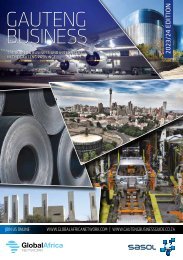Western Cape Business 2017 edition
The 2017 edition of Western Cape Business is the 10th issue of this highly successful publication that, since its launch in 2005, has established itself as the premier business and investment guide to the Western Cape province. The Western Cape has numerous promising investment and business opportunities and this issue includes contributions from Alan Winde (Minister of Economic Opportunities for the Western Cape Government), interviews with Ryan Ravens (CEO of Accelerate Cape Town), Arifa Parkar (Western Cape Business Opportunities Forum CEO), Wesgro CEO Tim Harris and Lance Greyling (Invest Cape Town) as well as contributions from various business leaders. In addition, you will also find comprehensive features on all the key sectors in the Western Cape.
The 2017 edition of Western Cape Business is the 10th issue of this highly successful publication that, since its launch in 2005, has established itself as the premier business and investment guide to the Western Cape province.
The Western Cape has numerous promising investment and business opportunities and this issue includes contributions from Alan Winde (Minister of Economic Opportunities for the Western Cape Government), interviews with Ryan Ravens (CEO of Accelerate Cape Town), Arifa Parkar (Western Cape Business Opportunities Forum CEO), Wesgro CEO Tim Harris and Lance Greyling (Invest Cape Town) as well as contributions from various business leaders. In addition, you will also find comprehensive features on all the key sectors in the Western Cape.
You also want an ePaper? Increase the reach of your titles
YUMPU automatically turns print PDFs into web optimized ePapers that Google loves.
OVERVIEW<br />
Water<br />
Farms and factories are becoming water wise.<br />
SECTOR INSIGHT<br />
WWF-South Africa and<br />
Woolworths are working on<br />
rural water plans.<br />
• UCT researchers have<br />
won a Water Research<br />
Commission prize.<br />
• French company Veolia<br />
is installing desalination<br />
plants.<br />
In 2030 South African demand for water will be 17% greater than<br />
supply. That is the verdict of the 2030 Water Resources Group.<br />
The <strong>Western</strong> <strong>Cape</strong>’s dams were at 61% in the fourth quarter of<br />
2016, against 90% at the same time in 2015. The biggest provincial<br />
dam, which is <strong>Cape</strong> Town’s main source of water as well as providing<br />
irrigation for farms, Theewaterskloof, stood at 52%, 14% down on the<br />
previous year. Elsewhere:<br />
• Garden Route Dam (George) was at 72% versus 100% in 2015<br />
• Kammanasie Dam (Oudtshoorn) was at 29% versus 100% in 2015<br />
• Hartebeestkuil Dam (Mossel Bay) was at 52% versus 88% in 2015<br />
In November 2016, the City of <strong>Cape</strong> Town introduced level-three<br />
water restrictions, banning all irrigation systems and hosepipes for<br />
domestic lawns.<br />
The good news is that South Africa and the <strong>Western</strong> <strong>Cape</strong> are doing<br />
something about the situation. Times of crisis can also be times when<br />
innovation and entrepreneurship come to the fore.<br />
The Water Resources Group, an international consortium of private<br />
companies, agencies and development banks, has established a South<br />
African chapter, the Strategic Water Partners Network (SWPN). It has a<br />
focus on three things: water efficiency and leakage reduction; effluent<br />
and wastewater management; and the agricultural supply chain.<br />
SWPN aims to support government and programmes have been put<br />
in place in all three areas that are showing results.<br />
The <strong>Western</strong> <strong>Cape</strong> Provincial Government has a two-pronged<br />
strategy: new water infrastructure for agriculture and water demand<br />
management programmes to<br />
improve efficiency.<br />
In terms of its water infrastructure<br />
and maintenance of its<br />
wastewater treatments plants,<br />
the <strong>Western</strong> <strong>Cape</strong> fares relatively<br />
well compared to most other<br />
South African regions. Only 3%<br />
of households reported to the<br />
General Household Survey of<br />
2014 that their water services had<br />
been interrupted. Fully 87.7% were<br />
satisfied with water delivery services.<br />
Access to water and sanitation<br />
in the province is generally<br />
very good.<br />
A provincial scheme to improve<br />
rivers has been outlined<br />
by Premier Helen Zille. The River<br />
Improvement Plan ultimately<br />
seeks to improve the lives of<br />
people living alongside rivers,<br />
but also ensure that river<br />
water quality enhances the region’s<br />
economy. The fruit, grape<br />
and wine sectors need good<br />
WESTERN CAPE BUSINESS <strong>2017</strong><br />
96


















